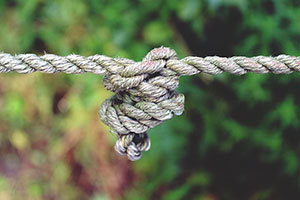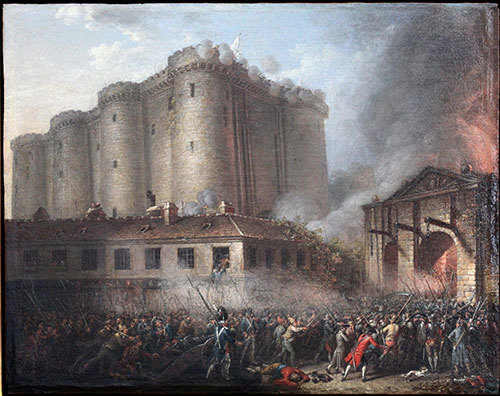Children’s games and some problematic English spellings
Several years ago, I wrote a series of posts titled “The Oddest English Spellings.” Later, The English Spelling Society began to prepare a new version of the Reform, and I let a team of specialists deal with such problems. Yet an email from one of our regular correspondents suggested to me that perhaps one more post in this blog may reinforce the interest of the public in how we spell English.
 This is a knot. Will it survive Spelling Reform?
This is a knot. Will it survive Spelling Reform?Most people will probably agree that “mute” letters are a nuisance. Who needs ch– in chthonic, p in pneumonia and psychology, or t in whistle, listen, and wrestle? This is especially true of consonants, and in the past, I have attacked gnaw, gnash, and gnat (gnats are hard to attack; see the header image), but treated know with compassion, because it coexists with acknowledge (aknowledge would certainly suffice!), but knee, knob, knife, and a few others are sad fossils: gn and kn have been silent in those words for at least three centuries. The efforts to reform English spelling are underway, and I very much hope that those efforts will bring fruit and that comunal service will be aknowleged. But in such a momentous endeavor, as in medicine, the most important thing is to do no harm. Perhaps knot might survive the Reform or become nott, to remain distinct from not and, true to its meaning, form an indissoluble union with knotted.
Especially troublesome is gn in the middle of some words. Dignity is of course fine, but deign is not, because modern speakers do not connect those etymologically related words. Let there be Dane and dein or dain (compare ordain) in English! Reign is tougher, since rein and rain already exist, while rane looks totally unfamiliar, and this is bad; also, interregnum preserves a weak link between reign and its Romance past. I am saying all this to reinforce my main point: in a language like English, with its confusing and maddeningly difficult spelling, few changes are possible across the board. The great number of homophones (Dane, deign; rain, rein, reign, arraign) complicates our task even further.
It would be tempting to adopt one spelling (dane) for all the “dein” words (the latter being a phonetic transcription) and, among other things, forget about the useless capitalization of Dane. After all, though we pronounce them alike, in speech we never confuse Dane and deign: context disambiguates such words for us. Perhaps we needn’t differentiate them on paper either? Don’t we have homophones and homographs like junk “trash” and junk “vessel”; “rash “eruption on the skin” and rash “hasty”; hail “salutation” and hail “falling from the sky”, and are none the worse for the existence of this medley? Unfortunately, any spelling reform, even the most modest one, is a serious social cataclysm, and the less people are inconvenienced, the better. Revolutions are exciting events for historians but often less so for victims and survivors. Perhaps, as I have often said, the Reform should be carried out in several steps.
 Storming of the Bastille. Revolutions are good to describe. (“Prise de la Bastille” by unknown artist, via Wikimedia)
Storming of the Bastille. Revolutions are good to describe. (“Prise de la Bastille” by unknown artist, via Wikimedia)Yet some things are clear. Align is sometimes spelled as aline, but rarely. Yet it is the best spelling for this verb. French aligner, from à ligne, goes back to Latin ad lineam. In French, gn designates a palatalized consonant, but in English it means nothing (an irritating mute letter). Align is also an ideal example for countering the insistence on the etymological principle as a guiding one for writing English words. The opponents of the Reform bewail a possible loss of historical ties, as though modern spelling is supposed to function as a substitute for a manual of language history.
We have Latin linea and French ligne. Whose heritage should we treasure more? I think we should, wherever possible, forget the past, treasure common sense, and (in this case) write line, aline, alinement, and so forth. A similar case is the spelling of rain. The Gothic for “rain” is rign (the form was recorded in the fourth century. In Old Icelandic, we find regn and in Modern German, Regen (from regan). The Common Germanic form must have had g in the root. In Old English, the word was also spelled with g, even though in this word, g had the value of Modern English y in yes. Should we spell rain as regn, to honor its distant past?
The stimulus for this post was a recent letter in which our correspondent asked me whether feint, faint, fain, and feign are related. The history of all four words is known. Feign goes back to Old French feign-; the situation with it is the same as with reign: in French, the letter g makes sense, while in English it does not. The infinitive of this verb is feindre (no g), and Old French for feint was feinte, the feminine past participle of that same feindre.
Thus, feign and feint are almost doublets, and indeed, feint means “feigned attack.” (It would therefore have been much more sensible to spell those words as fein and feint.) Faint, again from Old French faint or feint “feigned, sluggish, cowardly,” is also a continuation of the past participle of feindre. The verb faint was recorded somewhat later than the adjective faint.
It follows that faint is a full etymological doublet of feint! If we disregard the details, we can say that faint and feint are two variants of the same word, while feign is very closely related to them. Given such examples, perhaps even the most ardent supporters of the etymological principle in spelling will agree that at least sometimes it should be treated without too much reverence. (To avoid misunderstanding: I am not suggesting that faint and feint should be spelled alike. Today, my subject is only –gn–.)
 Feigning fainting? Next to it a real feint!” (Left: “A lady fainting after bloodletting”, by Egelon van der Neer. Right: “Korea London Women Team Fencing” by Korean Olympic Committee)
Feigning fainting? Next to it a real feint!” (Left: “A lady fainting after bloodletting”, by Egelon van der Neer. Right: “Korea London Women Team Fencing” by Korean Olympic Committee)Fains I (a formula of truce in games) is more problematic. Its local synonym feign knights looks like a garbled version of some phrase, and no one knows whether fain or feign is meant in it. The adjective fain “willing” (he is fain to discuss the problem) and the adverb fain “willingly” go back to Old English. They are archaic but still recognizable.
In the indispensable Notes and Queries, a hundred and fifty years ago, a long discussion of faintits fizzled out without a solution (faintits is one of many variants of fains I), but the idea that fain(s) derives from feign (so already in Notes and Queries) makes sense. The connection with fen (from fend) looks less probable. Even less probable is tracing fain(s) to fane “temple,” from Latin, a word almost forgotten, though it was much used in poetry by Byron and his contemporaries. Children’s games tend to preserve ancient formulas. Eeny meeny is a classic example; yet a Latin noun is an unlikely source of fains I ~ fains it.
Questions and comments are always inspiring. The query about feign and its lookalikes resulted in this post on the use of gn in the words of Modern English. If you are interested in such things, look up coin and coign in dictionaries, shed a tear while tracing the history of arraign, wonder at the fortunes of poignant and pungent, but, most importantly, don’t feign indifference when it comes to Spelling Reform and the Spelling Congress announced by the Spelling Society. Other than that, for today the game is over. Fains I!
Feature image by Hans Braxmeier from Pixabay
The post Children’s games and some problematic English spellings appeared first on OUPblog.

Oxford University Press's Blog
- Oxford University Press's profile
- 238 followers



